Medical expert of the article
New publications
Preparations
Anxiety pills
Last reviewed: 03.07.2025

All iLive content is medically reviewed or fact checked to ensure as much factual accuracy as possible.
We have strict sourcing guidelines and only link to reputable media sites, academic research institutions and, whenever possible, medically peer reviewed studies. Note that the numbers in parentheses ([1], [2], etc.) are clickable links to these studies.
If you feel that any of our content is inaccurate, out-of-date, or otherwise questionable, please select it and press Ctrl + Enter.
Stress in the modern world is not such a rare phenomenon. Despite the fact that the number of people with mental disorders is constantly growing, few people seek qualified help. Those who do decide to visit a specialist, most often receive a recommendation from him to undergo a course of treatment with special pills for anxiety.
Indications anxiety pills
In what cases is it worth visiting a doctor to get an effective remedy for stress and nervous tension?
- The person becomes more irritable.
- Unreasonable anxiety often appears.
- People, especially women, often cry when they are anxious.
- The person feels constant tension.
- Memory is impaired and attention is reduced.
- General weakness, headache, and nausea appear.
- Blood pressure may decrease or increase.
- There are cramps in the abdominal area.
Remember that it is often impossible to cope with anxiety and nervous tension on your own. That is why it is very important to visit a specialist in time, who will prescribe the appropriate pills.
 [ 1 ]
[ 1 ]
Release form
In the pharmacy today you can find a huge range of various drugs that are used to relieve stress and anxiety. The most popular of them are the following:
- Adepress.
- Alzolam.
- Amitriptyline.
- Afobazol.
- Diazepam.
- Carbamazepine.
- Quattrex.
- Xanax.
- Lerivon.
- Lorafen.
- Lorazepam.
- Nitrazepam.
- Nozepam.
- Paxil.
- Pleased.
- Rexetin.
- Relanium.
- Rudotel.
- Seduxen.
- Sibazon.
- Sonapax.
- Tenoten.
- Chlorprothixene.
- Flupentixol.
- Phenazepam.
- Elivel.
- Escitalopram.
As you can see, there are a lot of effective and efficient anxiety pills available today. But you can only take them after a specialist's recommendation, so visit your doctor first.
Adepress
Antidepressant and psychoanaleptic. Medicine based on the active component paroxetine hydrochloride hemihydrate. It is an effective drug during the treatment of various nervous disorders, as it inhibits the reuptake of serotonin in the brain.
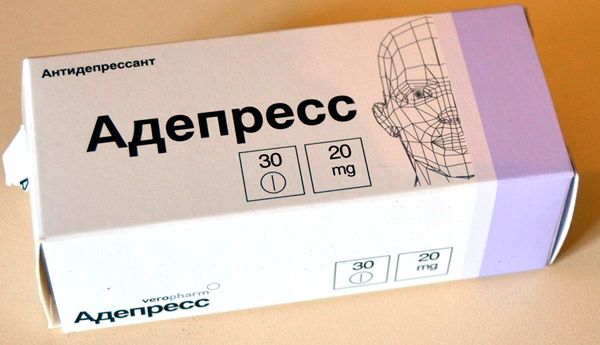
Adepress tablets are taken in a dosage of one tablet in the morning. It is recommended to wash down the drug with plenty of water. The first two to three weeks of therapy, the dose is selected by the doctor in accordance with the clinical picture, later it can be adjusted. The refusal of tablets should be smooth.
It is not recommended to take Adepress if the patient has been diagnosed with unstable epilepsy, allergy to paroxetine. Taking tablets during pregnancy and breastfeeding is prohibited. Do not take with MAO inhibitors, as well as for two weeks after stopping them.
In case of overdose, the patient's pupils dilate, nausea and headache appear, blood pressure changes, tachycardia and involuntary muscle contractions may develop. Treatment is symptomatic, gastric lavage and activated carbon are often used.
Taking Adepress may cause drowsiness, myasthenia, myalgia, myoclonus, mydriasis, paresthesia, serotonin syndrome, urinary retention, nausea, headaches, orthostatic hypotension, and allergies.
Alzolam
Psycholeptic tranquilizer. Medicine based on the active component alprazolam. It has central muscle relaxant, anxiolytic, anticonvulsant effects. It inhibits the central nervous system and also stimulates benzodiazepine receptors.
Alzolam can be taken regardless of food intake. The standard dosage is one tablet two to three times per 24 hours. It is recommended to use the minimum permissible doses whenever possible. For the treatment of elderly people, the dosage is changed according to the patient's condition.
"Alzolam" is not taken if the patient has been diagnosed with: shock, myasthenia, closed-angle glaucoma, alcohol or drug poisoning, suicidal tendencies, severe lung disease, apnea, acute or chronic liver and kidney disease. The drug is prohibited during pregnancy and breastfeeding.
Overdose occurs with simultaneous administration of 500-600 mg of the drug. In this case, the patient exhibits: confusion, drowsiness, tremor, nystagmus, dyspnea, bradycardia. Therapy is symptomatic.
Taking the tablets may cause headaches, confusion, drowsiness, euphoria, muscle weakness, agranulocytosis, paradoxical reactions, anemia, neutropenia, dry mouth, urinary incontinence, dysmenorrhea, allergies, diplopia.
Amitriptyline
Psychoanaleptic and antidepressant. The drug is based on the active component amitriptyline hydrochloride. It is a tricyclic antidepressant, which is classified as a non-selective inhibitor.
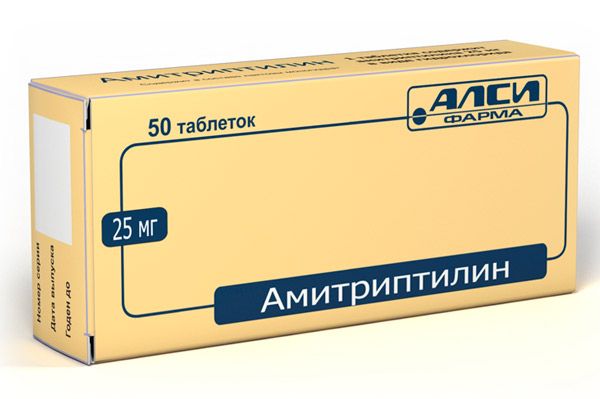
The initial dosage is 25 mg of the drug three times per 24 hours. It is gradually increased to 50 mg of the drug. The maximum daily dose is 200 mg. After two to four weeks, a stable antidepressant effect occurs, after which the dosage is gradually reduced.
Amitriptyline tablets are prohibited if the patient has been diagnosed with: abnormal liver function, arterial hypertension, atony of the bladder, myocardial infarction, pyloric stenosis, heart failure, allergy to amitriptyline hydrochloride. Pregnant women and those who breastfeed should not take it.
In case of drug overdose, the patient may feel drowsiness, depression of consciousness, disorientation, increased body temperature, vomiting, respiratory depression, dysarthria, hallucinations. For treatment, gastric lavage is used, and the intake of tablets is stopped.
The use of this drug may cause some side effects: tremor, dizziness, headaches, tinnitus, ataxia, arrhythmia, anorexia, taste changes, vomiting, nausea, heartburn, gastralgia, photosensitivity, thrombocytopenia, leukopenia, allergy, agranulocytosis.
Afobazol
Tranquilizer, psycholeptic. Medicine based on the active component morpholinoethylthioethoxybenzimidazole dihydrochloride. It has an anxiolytic effect, but does not have muscle relaxant properties.
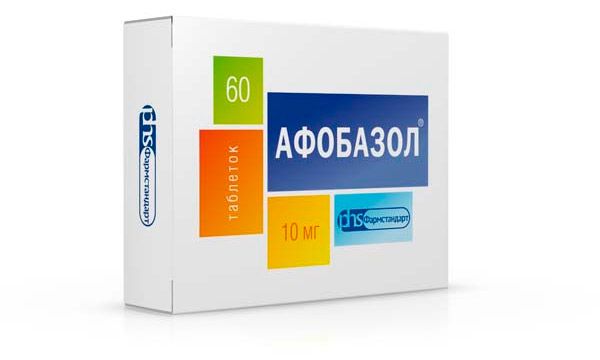
It is recommended to take Afobazol tablets after meals, with a sufficient amount of liquid. No more than 10 mg of the drug can be taken at a time. The daily dose is 30 mg (three times). The therapy lasts up to four weeks. If a positive result appears slowly, the duration and dosage can be increased.
It is not recommended to use Afobazol to treat patients under 18 years of age, pregnant women and women who breastfeed. It is prohibited if an allergy to the main component of the product is diagnosed.
An overdose of tablets is possible only with a very large change in dosage to the higher side. In this case, a sedative effect may develop, which is treated by administering 20% sodium caffeine benzoate orally. Taking Afobazole may lead to the development of an allergy.
 [ 11 ]
[ 11 ]
Diazepam
Tranquilizer, psycholeptic. Medicine based on the active component diazepam. It has a sedative, anxiolytic, central muscle relaxant and anticonvulsant effect.
The standard dosage of this drug is as follows: 500 mcg - 60 mg of the drug per day. In this case, the frequency of administration and the permissible single dose are determined by the attending physician individually.
Diazepam tablets are prohibited for use if the patient has been diagnosed with drug or alcohol dependence, hypercapnia, myasthenia, or allergy to diazepam.
Taking the drug may cause dizziness, drowsiness, depression, diplopia, agitation, hallucinations, nausea, constipation, headaches, urinary incontinence, decreased blood pressure, and allergies.
 [ 12 ]
[ 12 ]
Carbamazepine
Antiepileptic drug with anticonvulsant effect. Medicine based on the active component carbamazepine.
It is recommended to take the tablets with plenty of liquid, regardless of food intake. The dosage is 400-1600 mg of the drug, divided into two or three doses. If necessary, the attending physician may increase the dose. Stopping the intake cannot be abrupt.
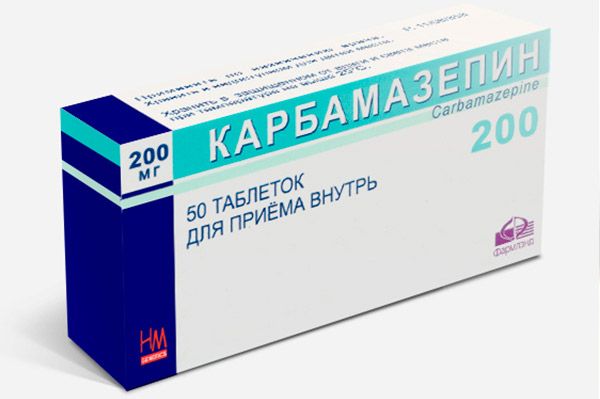
It is not recommended to take Carbamazepine for patients who have been diagnosed with: hepatic porphyria, AV block, low platelet or leukocyte levels. Do not use for therapy in old age, during lactation and pregnancy.
During an overdose, the patient experiences the following symptoms: tachycardia, pressure changes, pulmonary edema, convulsions, agitation, disorientation, dysarthria, myoclonus, vomiting, anuria, oliguria, hyperglycemia. For treatment, stop taking the drug and perform gastric lavage.
Taking Carmabazepine can lead to the development of many side effects: ataxia, dizziness, drowsiness, diplopia, headaches, allergies, hallucinations, photosensitivity, leukocytosis, pancytopenia, reticulocytosis, diarrhea, constipation, nausea, arthralgia.
Quattrex
Psychostimulant. A medicine based on the active component phenibut. It has a tranquilizing effect, helps stimulate learning and memory, improves performance, helps eliminate anxiety and stress. Thanks to taking this drug, the patient's sleep improves, headaches and other symptoms of nervous disorders go away.
It is recommended to take Quattrex tablets before meals. The standard dose for adult patients is 250-500 mg of the drug (divide the dose into three times). Therapy lasts up to six weeks. It is possible to combine the drug with other psychotropic drugs.
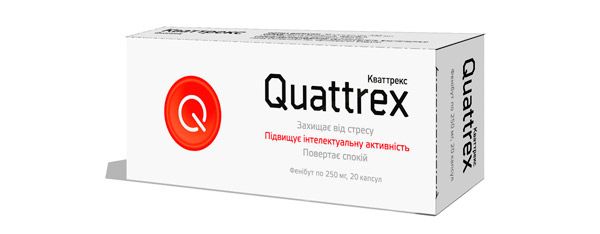
In case of various pathologies of the stomach and intestines, the tablets should be taken with caution. Do not use if you are allergic to phenibut, or have kidney problems. It is prohibited for children under 11 years of age, pregnant women, and nursing mothers.
During the first days of taking Quattrex tablets, you may experience drowsiness, extreme fatigue, nausea, headaches and dizziness.
Xanax
Tranquilizer, psycholeptic. Medicine based on the active component alprazolam. It has a sedative, anxiolytic, anticonvulsant, hypnotic effect.
The dosage of the drug is individual, but it is necessary to take the minimum effective doses whenever possible. The attending physician can adjust the intake of tablets during therapy. If it is necessary to increase the dose, this is done first in the evening, and then in the morning. The standard initial dosage is 250-500 mg per 24 hours. The drug is discontinued gradually.
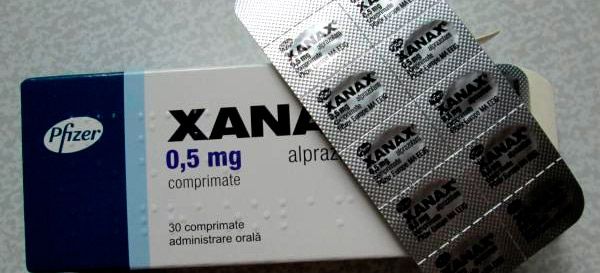
If the patient has been diagnosed with myasthenia, shock, acute alcohol poisoning, respiratory diseases, depression, allergy to alprazolam - then taking Xanax tablets is prohibited. Do not take during pregnancy and lactation.
Xanax tablets may cause dizziness, headaches, depression, euphoria, depressed mood, myasthenia, hallucinations, fear, dry mouth, diarrhea, leukopenia, agranulocytosis, dysmenorrhea, tachycardia, allergies.
Lerivon
Antidepressant, psycholeptic. Medicine based on the active component mianserin hydrochloride. It is used to treat sleep disorders associated with depression. The tablets are well tolerated even by elderly patients.
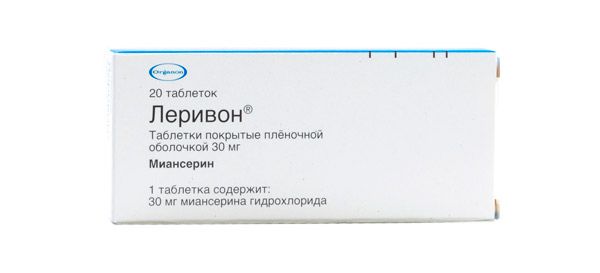
The drug is swallowed with a sufficient amount of liquid, without chewing. The attending physician individually determines the dosage of Lerivon in each specific case. But the standard initial dose is 30 mg of the drug. Gradually, the dosage is increased. Children under 18 years of age are prohibited from taking it.
For patients who have been diagnosed with: mania, allergy to mianserin, liver disease, taking the drug is not recommended.
Even with a strong overdose, patients only experience an increased sedative effect of the drug. Gastric lavage is used for therapy.
Taking Lerivon may cause: hypotension, jaundice, arthralgia, granulocytopenia, heart and vascular disease, exanthema, edema, allergy.
Lorafen
Tranquilizer, psycholeptic. Medicine based on the active component lorazepam. It has a sedative, anxiolytic, hypnotic, antiemetic, anticonvulsant effect.
The dosage of Lorafen tablets is determined by the attending physician. The standard dose for treating anxiety is up to 2 mg of the drug (divided up to three times). For the treatment of elderly patients, the dose is halved.
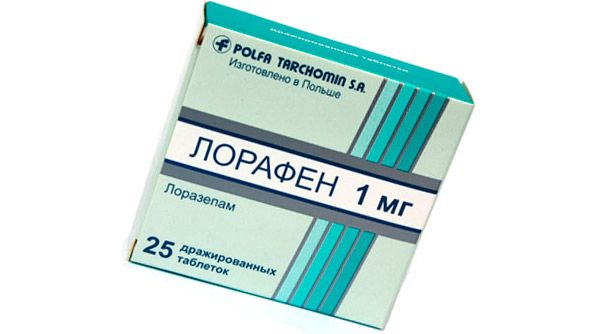
It is prohibited to take Lorafen tablets if patients have previously been diagnosed with: closed-angle glaucoma, respiratory disorders, impaired consciousness, allergy to lorazepam, myasthenia. It is not recommended for pregnant women and nursing mothers to take the tablets.
Overdose of the drug may cause pigmentation disorders, drowsiness, confusion. Treat symptomatically.
Taking Lorafen tablets may cause the development of: vomiting, nausea, dizziness, headaches, confusion, sleep disorders, memory impairment, depression, allergies.
Lorazepam
An anti-anxiety drug that is often used to treat neuroses. The drug is based on the active component lorazepam. It has anticonvulsant, central muscle relaxant, anxiolytic, hypnotic, antiemetic, sedative effects.
The following dosage is used for Lorazepam treatment: 2 mg of the drug (adult patients) three times in 24 hours. It is important to drink one part of the dose before bedtime. It is worth noting that the dosage can be prescribed individually. But it cannot exceed the maximum established daily dose - 10 mg of the drug. Abrupt withdrawal of Lorazepam can lead to insomnia, tremors, convulsions, increased anxiety, headaches, muscle pain, agitation.
If the patient has such diseases as closed-angle glaucoma, alcohol intoxication, myasthenia, intoxication with other psychotropic drugs, allergy to lorazepam, taking the drug is prohibited. Lorazepam in tablets is not prescribed for the treatment of pregnant women, nursing mothers, children under twelve years of age.
Taking Lorazepam can lead to the development of: severe fatigue, ataxia, muscle weakness, amnesia, dizziness, loss of appetite, nausea, constipation, diarrhea and dysphagia, allergies.
Nitrazepam
A sleeping pill. A medicine based on the active component nitrazepam. It has anxiolytic, sleeping pill, central muscle relaxant and anticonvulsant effects.
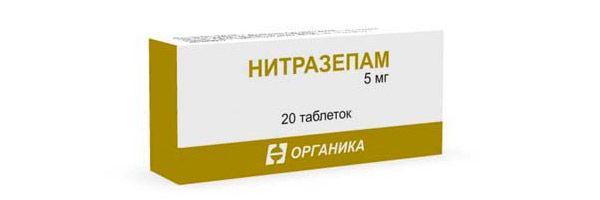
The frequency and dosage of taking the drug is prescribed only by a specialist. The daily dose for adult patients may vary: 2.5 mg - 25 mg. Patients who have been diagnosed with the following diseases: alcohol intoxication, acute respiratory diseases, temporal epilepsy, myasthenia, closed-angle glaucoma, taking the drug is prohibited.
Taking Nitrazepam may cause the development of: slow reactions, constant fatigue, headaches, amnesia, ataxia, muscle weakness, confusion, visual impairment, diarrhea, arterial hypertension, allergies.
Nozepam
Tranquilizer. A medicine based on the active component oxazepam. It has a sedative, anxiolytic, and anticonvulsant effect.
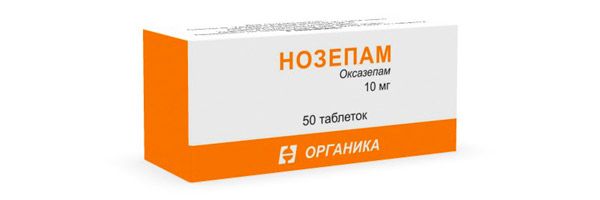
The dosage can only be determined by the attending physician. This is done individually and depends on the clinical picture. The standard daily dose may vary: 10-120 mg of the drug. The duration of therapy is also determined by the specialist. Treatment cannot be stopped abruptly.
Patients who have been diagnosed with alcohol intoxication, closed-angle glaucoma, myasthenia, severe depression, respiratory failure, or allergy to oxazepam are not recommended to use the tablets. Do not take if you are pregnant, breastfeeding, or have children.
Nozepam tablets may cause the development of: drowsiness, fatigue, dizziness, tremor, depression, ataxia, hallucinations, neutropenia, leukopenia, anemia, urinary retention, allergies, dysmenorrhea, nausea, heartburn.
Paxil
Psychoanaleptic, antidepressant. A medicine based on the active component paroxetine hydrochloride hemihydrate. These tablets are often prescribed to treat depressions caused by excessive anxiety. At the same time, this drug is often prescribed when other means have not brought positive results.
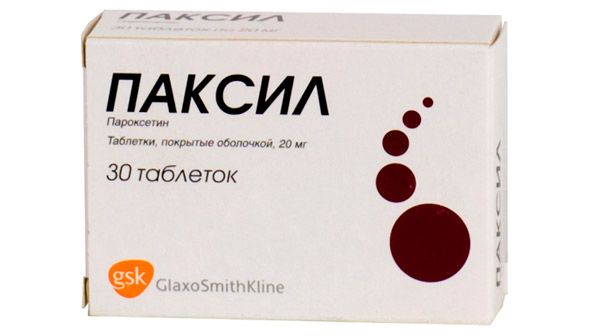
For the treatment of depression and anxiety, Paxil tablets are taken in a daily dosage of 20 mg of the drug. If necessary, the attending physician may increase the dosage by 10 mg each week. Do not take more than the established maximum daily dose of 50 mg.
It is not recommended to take Paxil together with thioridazine, MAO inhibitors, pimozide. It is prohibited to use these tablets for therapy of children. Taking the drug can cause the development of: allergies, decreased appetite, hyponatremia, drowsiness, confusion, hallucinations, tremors, headaches, mydriasis, sinus tachycardia.
Pleased
An antidepressant based on the active ingredient paroxetine mesylate. Often used to treat depression with excessive anxiety, as well as other mental disorders.
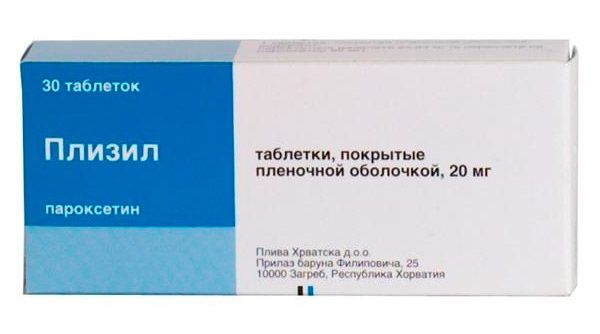
Plizil tablets should be taken in a dosage of 20 mg of the drug daily. If necessary, the specialist can increase the dose every week by 10 mg until it reaches 50 mg per day (the maximum possible). This depends on how the patient reacts to the drug.
It is not recommended to take these tablets together with MAO inhibitors, allergy to paroxetine mesylate. Taking the drug is also prohibited for the treatment of children (under 18 years), pregnant women and nursing mothers.
Overdose of Plizil may cause nausea, vomiting, tremor, agitation, headaches, fever. Treatment is symptomatic. Taking Plizil tablets may cause the following unpleasant effects: arthralgia, insomnia, nervousness, myasthenia, genitourinary disorders, orthostatic hypotension, ecchymosis, allergy.
Rexetin
An antidepressant based on the active component paroxetine hydrochloride hemihydrate. It is actively used to treat anxiety and depression caused by it.
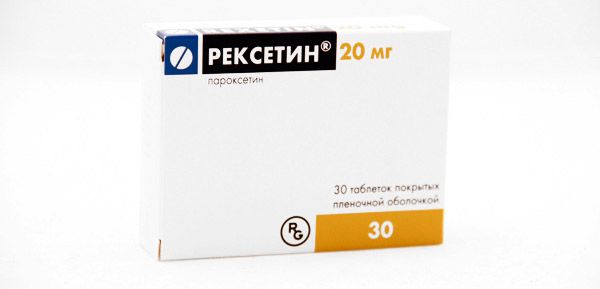
The tablets are taken once every 24 hours during meals. As with other antidepressants, Rexetin should be taken for up to three weeks, after which the attending physician may change the dosage to obtain a positive result. It should be understood that the effect of Rexetin tablets does not occur immediately.
Do not take this drug with MAO inhibitors, in epilepsy, for the treatment of children, pregnant women and during lactation. Sometimes Rexetin tablets can cause constipation, decreased appetite, drowsiness, tachycardia, increased intracranial pressure, tremor, mydriasis, diarrhea, headaches, allergies.
Relanium
An antidepressant based on the active component diazepam. It depresses the central nervous system, so it is often prescribed for the treatment of neurosis-like anxiety disorder.
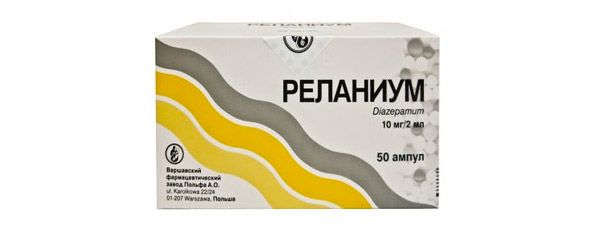
The dosage of Relanium is individual, so it is determined by the attending physician. It is possible to use the drug even for the treatment of newborn children (only for the solution).
Overdoses are possible, leading to drowsiness, paradoxical arousal, nystagmus, depression of consciousness, decreased reflexes, tremor, collapse, dysarthria. Treatment should be by gastric lavage.
Patients who have been diagnosed with severe myasthenia, closed-angle glaucoma, sleep apnea syndrome, respiratory disorders, alcohol intoxication should not use Relanium tablets. It is also prohibited to use at the age of up to thirty days, during lactation and pregnancy.
Taking these tablets may cause the development of tachycardia, leukopenia, agranulocytosis, hypersalivation, constipation, allergies, and dysmenorrhea.
Rudotel
Tranquilizer based on the active component diazepam. It has a muscle relaxant, anxiolytic, anticonvulsant effect.
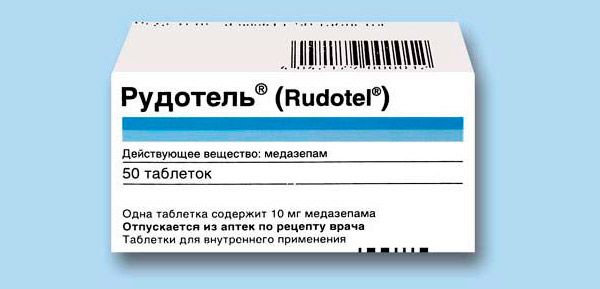
At first, Rudotel should be taken in a dosage of 5 mg of the drug (divided into two or three times). Gradually, the daily dose is increased to 30 mg of the drug. The duration of treatment is determined by the attending physician.
Patients who have been diagnosed with myasthenia, sleep apnea, acute and chronic kidney disease, addiction (alcohol, medical), allergy to diazepam are prohibited from using the tablets. Not prescribed to children, pregnant and nursing mothers.
Rudotel tablets may cause the development of some unpleasant symptoms: tremors, constipation, diarrhea, headaches, allergies, decreased potency and libido, tachycardia, and deterioration of the respiratory system.
Seduxen
Tranquilizer based on the active component diazepam. It has an anxiolytic effect. It also has a central muscle relaxant and anticonvulsant effect.
To avoid the development of unpleasant complications, it is necessary to strictly adhere to the doctor's recommendation for taking Seduxen tablets. The dosage is determined based on the clinical picture, but at first, minimal doses are taken, which are gradually increased. It should be remembered that a single dose cannot be more than 10 mg of the drug.
Overdose is possible, which entails increased depression, drowsiness, comatose state. Therapy consists of symptomatic treatment. Taking Seduxen can cause the appearance of some unpleasant symptoms: headaches, dizziness, drowsiness, allergies, vegetative disorder, jaundice, addiction.
Sibazon
An antidepressant based on the active component diazepam. Helps cure mental disorders, schizophrenia, neurasthenia, anxiety. One tablet contains 5 mg of the drug.
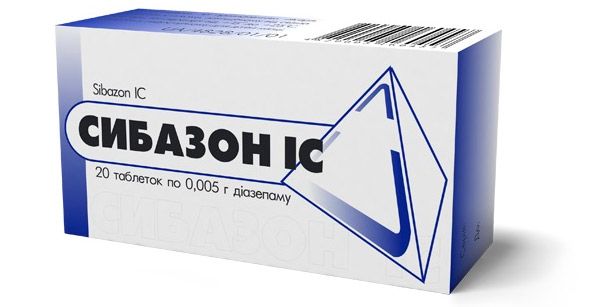
It is recommended to start treatment with taking 2.5-5 mg of the drug per 24 hours. The dosage is gradually increased, but cannot be more than 60 mg (divided into two or three doses).
Patients who have been diagnosed with myasthenia, kidney and liver dysfunction, or allergy to diazepam are not recommended to take Sibazon tablets. Taking it may cause drowsiness, tremors, allergies, and headaches.
Sonapax
A neuroleptic based on the active component thioridazine. It has antipruritic, antipsychotic, antidepressant, tranquilizing effects.
The dosage of Sonapax is determined by the attending physician based on the severity of the patient's condition and age. For anxiety, the dose is usually 10-75 mg of the drug per 24 hours. Therapy begins with the lowest dose and gradually reaches the highest.
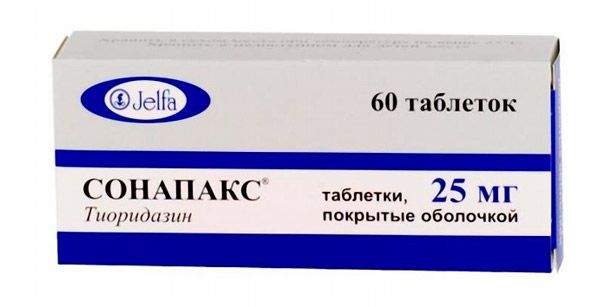
If the patient has been diagnosed with arrhythmia, acute or chronic liver pathologies, blood diseases, or central nervous system depression, the tablets should not be taken. They are also prohibited in childhood (four years), during pregnancy, and during breastfeeding.
Overdose of Sonapax tablets may lead to arrhythmia, tachycardia, mydriasis, decreased motility, uremia, areflexia, oliguria. Treatment is symptomatic.
Sonapax tablets may cause the development of erythema, allergy, leukopenia, diarrhea, insomnia, dysmenorrhea, photophobia, melanosis of the skin.
Tenoten
A nootropic agent that has an anxiolytic effect. The drug is based on the active component of affinity purified antibodies to the brain-specific protein S-100.

You can take no more than two pills at a time. They should be kept in the mouth until dissolved, not swallowed. It is recommended to take up to two times in 24 hours, but can be increased to four times. The therapy lasts one to three months.
No side effects from the use of Tenoten were identified.
Chlorprothixene
A psycholeptic based on the active component chlorprothixene hydrochloride. It has an antipsychotropic effect.
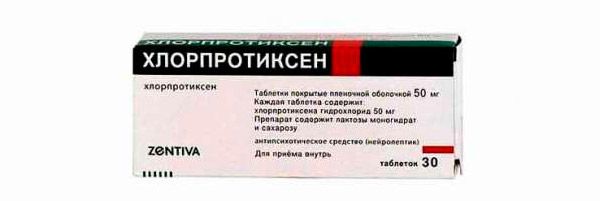
For depressions caused by anxiety, Chlorprothixene tablets are recommended to be taken in the following dosage: no more than 90 mg of the drug (divided into two or three doses).
If patients have been diagnosed with vascular collapse, diseases of the hematopoietic organs, pheochromocytoma, taking tablets is prohibited. Do not use for the treatment of pregnant women, nursing mothers and children.
Taking Chlorprothixene tablets may cause dizziness, allergies, tremors, leukopenia.
 [ 16 ], [ 17 ], [ 18 ], [ 19 ]
[ 16 ], [ 17 ], [ 18 ], [ 19 ]
Flupentixol
A neuroleptic based on the active component flupentixol decanoate. It has an antipsychotropic effect, so it is often used to treat depression caused by anxiety.
The dose, duration and frequency of taking Flupentixol tablets depend on the severity of the clinical picture, so only the attending physician can accurately determine how and how much to take the drug. You cannot take more than the established daily dose - 40 mg of the drug.
Patients who have been diagnosed with alcohol intoxication, opioid analgesics, balbiturates, as well as anemia, liver and kidney dysfunction, agranulocytosis, fever, Parkinson's disease, are prohibited from taking Flupentixol tablets.
Taking tablets may cause headaches, transient insomnia, sedative effects, and dyskinesia.
Phenazepam
A tranquilizer based on the active component phenazepam (bromdihydrochlorophenylbenzodiazepine). It has anxiolytic, sedative, and hypnotic effects.
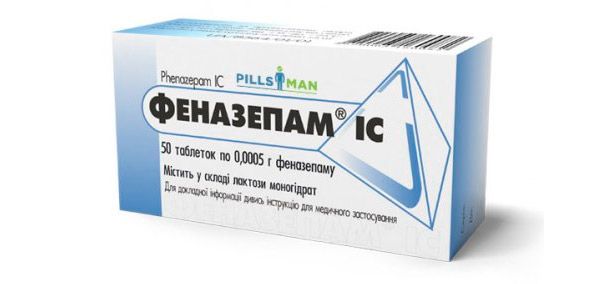
A single dose of Phenazepam tablets cannot exceed 1 mg of the drug. On average, a patient can take up to 5 mg of the drug per day (divided into two or three doses). The dosage is determined by the attending physician based on the severity of the clinical picture.
Patients in a coma, with diagnosed myasthenia, closed-angle glaucoma, pathologies of the respiratory system should not take Phenazepam tablets. They are prohibited for the treatment of pregnant women and women who breastfeed.
If the drug overdose is high enough, the patient develops cardiac and respiratory depression. It is treated symptomatically.
Phenazepam tablets can cause allergies, ataxia, muscle spasms, hallucinations, neutropenia, leukopenia, heartburn, dysmenorrhea, diplopia.
Elivel
An antidepressant based on the active component amitriptyline. It is used to treat depression and anxiety even in childhood.
Elivel tablets should be taken after meals, without chewing, with a sufficient amount of liquid. At first, the dosage for adult patients is no more than 50 mg, then the dose is increased to 200 mg (divided into three doses). When the first signs of depression have disappeared, the dosage is gradually reduced.
Patients who have been diagnosed with the following diseases: myocardial infarction, closed-angle glaucoma, bronchial asthma, thyrotoxicosis, epilepsy, urinary retention, medical intoxication, intraocular hypertension, are prohibited from taking Elivel tablets. Do not take during pregnancy.
Long-term use of Elivel tablets may cause constipation, diarrhea, headaches, dizziness, ataxia, asthenia, anxiety, disorientation, paralysis, tachycardia, urinary retention, hepatitis, myoclonus, agranulocytosis, increased testicular size, poplakiuria, sleep disturbances, hallucinations.
Escitalopram
An antidepressant based on the active ingredient escitalopram. It is used to treat major depressive disorders that are caused, in particular, by anxiety.
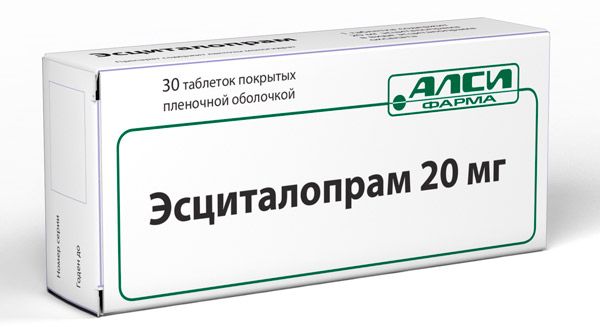
It is recommended to take Escitalopram tablets once every 24 hours, regardless of food intake. As a rule, doctors set the following dosage for the treatment of anxiety: 10 mg of the drug at the beginning of the course, followed by an increase to 20 mg.
Escitalopram should not be taken simultaneously with MAO inhibitors. Patients with allergies to the active substance are prohibited from taking it.
Escitalopram tablets may cause thrombocytopenia, appetite disturbances, anaphylactic reaction, aggression, hallucinations, tachycardia, headaches, dizziness, allergies.
Pharmacodynamics
Let's consider the pharmacodynamics and pharmacokinetics of anti-anxiety pills using the popular drug "Sibazon" as an example.
The active substance diazepam excites benzodiazepine receptors, which leads to activation of GABA-ergic systems. The drug also activates the inhibitory functions of GABA.
Contraindications
- Allergy.
- Pregnancy and breastfeeding.
- Childhood (for some tablets).
- Myasthenia gravis.
- Disorders of the kidneys and liver.
- Acute and chronic pathologies of the respiratory system.
- Myocardial infarction.
- Bronchial asthma.
- Epilepsy.
- Urinary retention.
- Closed-angle glaucoma.
- Addictions (drug, alcohol).
- Intoxication (alcohol, pills).
- Taking MAO inhibitors simultaneously.
- Depression.
- Mania.
- Shock.
Side effects anxiety pills
- Allergy.
- Hallucinations.
- Aggression.
- Tachycardia.
- Ataxia.
- Anemia.
- Headaches.
- Dizziness.
- Diarrhea.
- Constipation.
- Heartburn.
- Hyponatremia.
- Decreased potency and libido.
- Drowsiness.
- Insomnia.
- Tremor.
- Loss of appetite.
- Decreasing or increasing pressure.
- Diplopia.
- Arthralgia.
 [ 35 ]
[ 35 ]
Shelf life
The expiration date is 3-5 years. Do not take anxiety pills after this date.
 [ 38 ]
[ 38 ]
Attention!
To simplify the perception of information, this instruction for use of the drug "Anxiety pills" translated and presented in a special form on the basis of the official instructions for medical use of the drug. Before use read the annotation that came directly to medicines.
Description provided for informational purposes and is not a guide to self-healing. The need for this drug, the purpose of the treatment regimen, methods and dose of the drug is determined solely by the attending physician. Self-medication is dangerous for your health.

